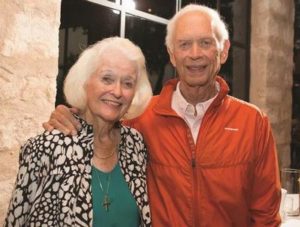Some of us are thrilled to see Donald Trump become our President elect, while some of us are heartbroken that Hillary didn’t win. Some are mourning that we have yet to break the glass ceiling by having a woman serve as our President, while some are so angry at the election outcome that they are protesting in the streets. Many of us are just glad the election is OVER. Whether you’re filled with hope or disappointment, I believe all of us can rest in the outcome of this Presidential election by remembering three truths about God.

Photo Courtesy @ amerika.org
Truth #1: God is sovereign and carries 51% of the vote in all elections.
“The lot is cast into the lap, but its EVERY DECISION IS FROM THE LORD” (Prov 16:31)
The media had us convinced based on certain polls that Hillary would win this election. As the battle states started to turn more red than blue, the Democrats began to feel uneasy. Political analysts began to admit that these were not good signs for Hillary. By the time the votes were counted, Trump had pulled off an amazing political feat. Political commentators were forced to ask why the polls were so off. Some were suggesting that the pollsters should be fired! The Bible tells us that “The king’s heart is in the hand of the Lord; he directs it like a watercourse wherever he pleases.” (Prov 21:1) God made sure that the majority of hearts were turned toward Trump for this election. It’s good to be reminded that no pollster, no pundit, no person could predict who the Lord would choose.
Truth #2: God is trustworthy.
“Trust in the Lord always, and lean not on your own understanding, but in all your ways acknowledge Him, and He will make your paths straight.” (Prov 3:5-6)
Mr. Trump makes some people nervous. Hillary has thirty years of experience as a public servant, and Donald does not. Donald boldly announced that he intends to deport at least three million undocumented workers who are criminals. He’s ready to repeal and replace the majority of provisions in the Affordable Care Act. He’s added a controversial Chief Strategist, Steve Bannon, who will have significant influence in the White House. Will Mr. Bannon advance unhealthy ideologies found on his website that allowed a platform for white nationalists? Will Trump govern with a level head as he meets with domestic and foreign leaders? It’s hard to trust Trump after watching how he conducted himself throughout his campaign. I understand why there are people who are feeling unsettled with Trump as President.
But our trust is not in Trump! Our trust is in the Lord who allowed Trump the office of President. God already knows Trump doesn’t have any political experience. He knows Trump’s temperament because He created him. He knows his strengths and his weaknesses. God knows exactly what He wants to accomplish in the next four years through Trump. It’s easier to rest in the outcome of this election when we commit to trust in the Lord only, even when the outcome doesn’t make sense to us.
Truth #3: God’s purposes cannot by thwarted.
“I know that you can do all things; no plan of yours can be thwarted. (Job 42:2)
If you’re feeling any angst over this election outcome, I want to invite you to look at the bigger spiritual picture. God gave us the gift of life. He ordained when we arrived and He already knows the day we will die. He allowed us to live in America and for this unique chapter of time. God’s divine purpose underlies everything that happens, including the election of Donald Trump as President. We will get to watch what God is up to over the next four years! I’m sure Mr. Trump will have his successes, and he’ll have failures. That’s our story too, yet God continues to work out His purpose through our lives. I take comfort knowing that God is intentional in this decision because He always has our best interest in mind as a country.
Now that this election is over, God has called us to PRAY for Mr. Trump and those in office who are leading this great country. If we accept that God’s purpose cannot be thwarted, then one of the best ways to show our support for God’s choice is to pray fervently for Mr. Trump and his staff.
Let’s rest in the fact that Trump will be our President by placing all of our trust in God. He is sovereign, trustworthy and faithful to accomplish His purposes. He will do it through Mr. Trump just like He does it through us.
I have provided some truths about God that allows us to rest with Mr. Trump as our new President. Are there other truths about God that helps you rest with the outcome of this election? I’d love to hear your thoughts below.
Blessings,
Lee Ann


